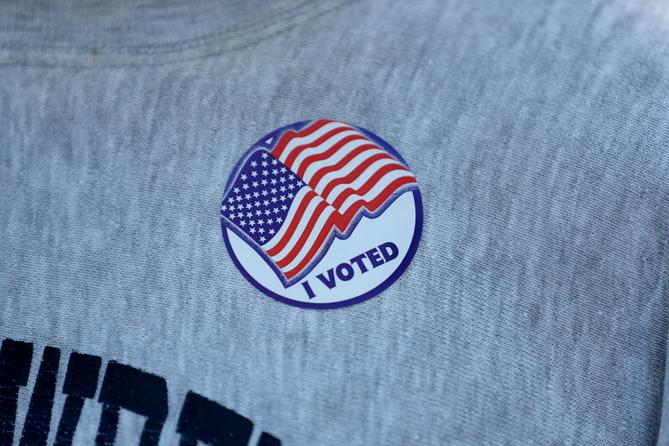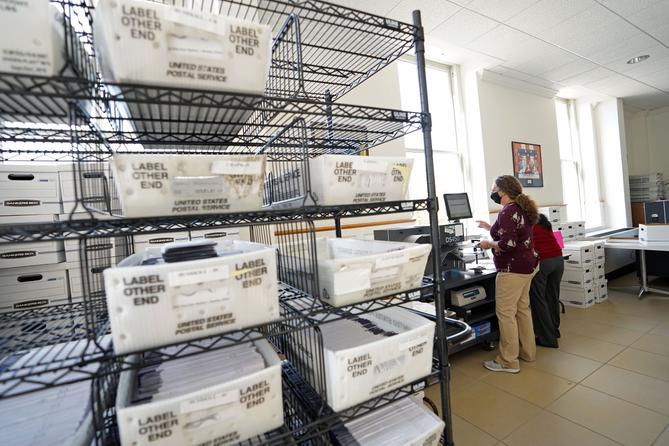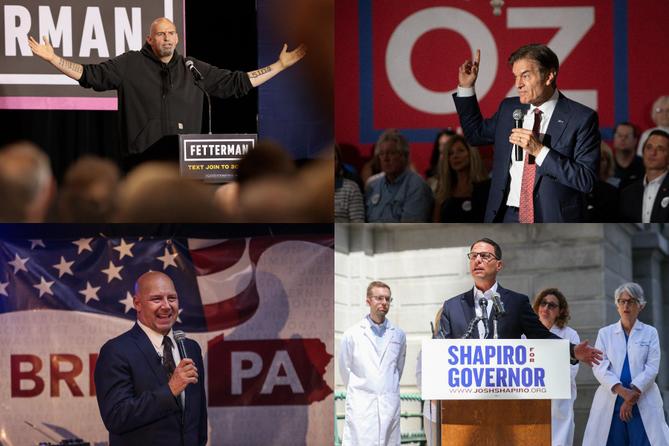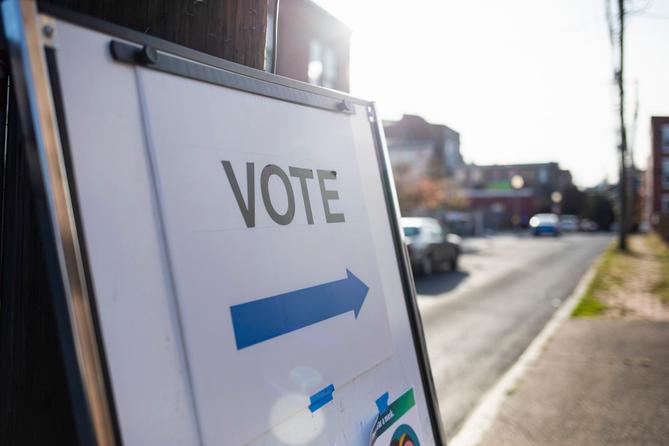Spotlight PA is an independent, nonpartisan newsroom powered by The Philadelphia Inquirer in partnership with PennLive/The Patriot-News, TribLIVE/Pittsburgh Tribune-Review, and WITF Public Media. Sign up for our free newsletters.
HARRISBURG — On Nov. 8, Pennsylvanians will make their way to polling places to decide the governor’s race and U.S. Senate race as part of Election Day 2022.
Voters will also have the equally important opportunity to elect representatives and senators to the state’s General Assembly after a monumental redistricting cycle that redrew the district lines; the change could alter the balance of power in the state House.
To help you prepare for Election Day 2022 in Pennsylvania, we’ve answered some of your most frequently asked questions below:
When is the 2022 Election Day in Pennsylvania?
Tuesday, Nov. 8, 2022. Mark your calendar!
When do polls open for Pennsylvania’s 2022 election?
Polls open at 7 a.m and close at 8 p.m. As long as you are in line to vote by 8 p.m., you are entitled to cast a ballot.
When is the last day to register to vote?
The last day to register is Oct. 24.
You can register online here, or submit a registration form in person or through the mail to your county election office by the same date.
Online voter registration applications must be submitted by 11:59 p.m that day. Mail and in-person applications must be received by the county board of elections by 5 p.m.

How can I check my registration?
You can check your registration here. You can search using your name, county, zip code, and birthday, or by entering your driver’s license or PennDOT identification card number.
How do I change parties?
To change your party affiliation, fill out the same voter registration form that you used to register the first time.
When filling out the form, select the box that says “change of party.” If you register less than 15 days before the election, the change will not take place until the next election cycle.
I’m a registered independent. Can I still vote on Nov. 8?
Absolutely! Unlike during Pennsylvania’s primaries, all registered voters can vote for any candidate during the general election.
How do I find my polling place?
You can find your polling place here by entering your address.
What else do I need to know to vote in person?
If this is your first time voting or your first time voting since changing address, you’ll need to bring proof of identification. This can include any government-issued ID such as a driver’s license or U.S. passport, a utility bill or bank statement that includes your name and address, or a military or student ID. See the full list of options.

Can I still request a mail ballot?
You can apply for a mail ballot until 5 p.m. Nov. 1, either online or through the mail. Here’s the application. You’ll need to provide your name, date of birth, proof of identification, and signature.
How do I vote absentee?
The process to request an absentee ballot is similar to that for requesting a mail ballot. You can apply online or download the form and send it to your county election office. However, the application requires you to list a reason for your absence, unlike a mail ballot. You can find the application here.
The deadline to apply is 5 p.m. Nov. 1.
If you miss the Nov. 1 deadline, you can still request an emergency absentee ballot from your county election office if you experience an unexpected illness, disability, or last-minute absence. You can request one here.
I applied but still haven’t gotten my absentee or mail ballot. What should I do?
You can check the status of your absentee or mail ballot here. If you’re worried your ballot won’t arrive with enough time to return it, you can call your county election office for advice on how to proceed.
You can also go to your county election office to request a ballot and fill it out on the spot or go to your polling place and vote in person on Election Day.
I’ve received my absentee or mail ballot. How do I return it?
First, make sure you’ve filled it out completely and followed all instructions. Otherwise, your ballot may be thrown out.
Everyone can return their ballot through the mail or by dropping it off at their county election office. Some counties also have drop boxes available. Find county contact information here.
Your county election office must receive your ballot by 8 p.m. on Election Day.
If you have a disability that prevents you from returning your own ballot, you may fill out a form to designate someone else to return it for you. You must turn in the form with your mail ballot application, and the designee must have a copy on hand when they return your ballot.
Otherwise, you must return your own ballot.

Which races will I be voting on?
Pennsylvania hosts two of the highest-profile races this year — one for an open U.S. Senate seat and the other for the governor’s office.
Democratic Gov. Tom Wolf is term-limited and cannot seek reelection next year. He has often served as the foil to the Republican legislature during his tenure.
With the governor’s office up for grabs, the Republican party has a chance to control two branches of government and enact legislation that was blocked by Wolf.
The two major gubernatorial candidates in the general election offer starkly different views for the future of Pennsylvania.
State Sen. Doug Mastriano of Franklin County, the Republican nominee for governor, was elected to the General Assembly in 2019.
As a freshman senator, he rapidly rose to prominence in the months after the first cases of COVID-19 were reported in Pennsylvania. He became one of the most vocal critics of Wolf’s use of executive powers to impose mitigation measures such as statewide masking orders and business shutdowns. Mastriano also sharply criticized a waiver program for businesses to remain open — a program that was later found by the state’s top auditor to be inconsistent and unfair.
Mastriano also became the legislature’s lead defender of former President Donald Trump’s unfounded claims of widespread election fraud.
The Democratic candidate, Attorney General Josh Shapiro, was previously a state representative and Montgomery County commissioner.
He has touted his record as attorney general, highlighting his investigation of the role of pharmaceutical manufacturers and distributors in the nation’s opioid crisis, and his office’s prosecution of some natural gas companies. Shapiro’s office made international headlines for a scathing grand jury report on child sexual abuse and its coverup in nearly every Roman Catholic diocese in Pennsylvania.
Read more about the candidates and their positions.
The other high-profile race, for one of Pennsylvania’s U.S. Senate seats, also does not have an incumbent, as Republican Pat Toomey is retiring at the end of his term.
The Democratic nominee, Lt. Gov. John Fetterman, previously served as the mayor of Braddock, a small town near Pittsburgh. Fetterman is a longtime supporter of legalizing recreational cannabis, universal health care, and clean energy. He suffered a stroke shortly before the primary.
Mehmet Oz, the Republican nominee, has no traditional political experience but is famous for hosting a TV program about medicine and health as well as promoting dubious alternative medicines.
Oz has called himself a “conservative outsider.” He has said he would oppose gun control policies such as red-flag laws and universal background checks, and wants to focus on Pennsylvania’s “energy independence” by deregulating the fossil fuel industry to increase domestic energy production.
What else will be on my ballot?
Some voters will choose their state senator, and all voters will select their U.S. and Pennsylvania House representatives. These district lines were redrawn during this year’s redistricting process. Compare your old and new districts using Spotlight PA’s comparison tool.
There are no statewide constitutional amendments on this year’s ballot, but a few major amendments loom — such as one that would declare there is no legal right to abortion in the state constitution and another that would create judicial districts for the state’s courts system.
Some voters may see local ballot questions, including residents of Allegheny County and Philadelphia. Check with your county election office to be sure.
WHILE YOU’RE HERE… If you learned something from this story, pay it forward and become a member of Spotlight PA so someone else can in the future at spotlightpa.org/donate. Spotlight PA is funded by foundations and readers like you who are committed to accountability journalism that gets results.
